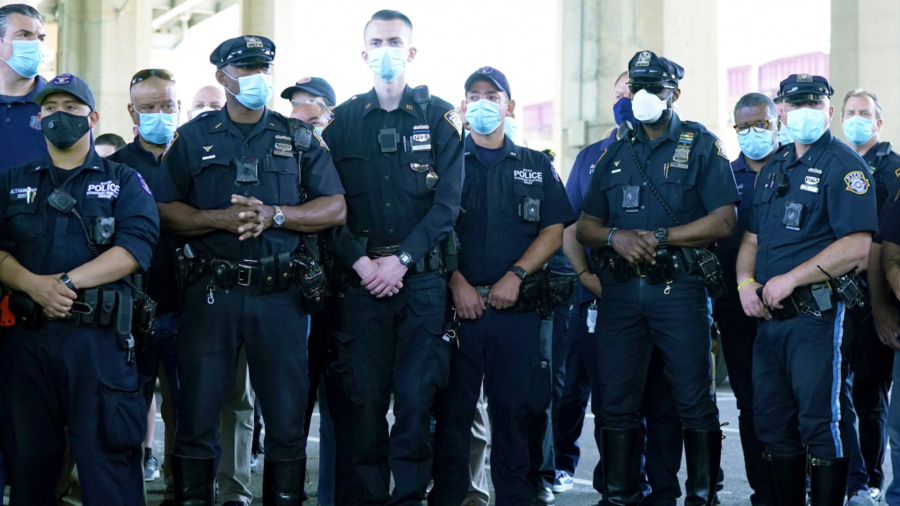Most African Americans say they prefer police to spend the same amount of time in their area, according to a new Gallup poll.
New polling data released on Aug. 5 found that 61 percent of African Americans surveyed want the police presence in their area to remain the same. Meanwhile, 20 percent of African Americans say they prefer police to spend more time in their area, while 19 percent say they prefer less time.
The results come at a time when tensions between the African American community and law enforcement have been highlighted following the death of George Floyd, an African American who died while in Minneapolis police custody in late May. Floyd’s death sparked national protests and riots calling for police reform and a change in criminal justice policy.
The “defund the police” movement emerged as part of the protests, calling for the reallocation of funds away from police departments to other social programs. The movement claims that police departments are systemically racist and that police funding can be better used elsewhere to help African American communities.
The poll, which was conducted between June 23 and July 6, found that the results for other racial groups were similar, with 71 percent of white Americans, 59 percent Hispanic Americans, and 63 percent of Asian Americans saying they’d prefer police presence to remain the same.
Of all the racial groups, Asian Americans are the most likely to prefer less police presence in their area, at 28 percent, compared to 12 percent for white Americans and 17 percent for Hispanic Americans.
African Americans are also more likely to see police in their neighborhood at 32 percent, compared to the average U.S. adult at 24 percent, the poll found. However, the pollster said this result has limited impact on the group’s preference for local police presence. They say only a third of African Americans who say they often see police think officers should spend less time in their area, at 34 percent. Most of the respondents in that group say police should spend the same amount of time in their neighborhood, at 56 percent.

However, the polling data also show that African Americans are less likely to feel confident about receiving positive treatment from police, with only 18 percent saying they feel very confident. This is in contrast to 56 percent for white Americans, 40 percent for Hispanic Americans, and 24 percent for Asian Americans.
“Most black Americans want the police to spend at least as much time in their area as they currently do, indicating that they value the need for the service that police provide,” Gallup said.
“However, that exposure comes with more trepidation for black than white or Hispanic Americans about what they might experience in a police encounter. And those harboring the least confidence that they will be treated well, or who have had negative encounters in the past, are much more likely to want the police presence curtailed.”
Gallup said the data in this poll are consistent with previously released findings conducted in the same time period, which showed that a majority of African Americans think major reforms are needed in policing, at 88 percent, but only 22 percent support abolishing police departments. Similar trends in results were observed for all U.S. adults, with 58 percent saying major changes are needed, and only 15 percent saying they support abolishing police departments.
The push to “defund the police” has been described as “extremely dangerous” by U.S. Attorney General William Barr. He said that instead of reallocating money away from police departments, more money should be allocated to departments to help address issues in policing practices and training.
“I’m more concerned that the police be adequately funded today and get more resources. A lot of the things we need to do to address some of the concerns people have about what they saw in Minneapolis are going to take some resources. Some of the training that we have to do,” Barr said during a congressional hearing late last month.
The poll was conducted as part of the Gallup Center on Black Voices, which it said is committed to reporting on the experiences of African Americans. It said the survey consists of large samples of African, Hispanic, and Asian Americans, weighted to match the U.S. population according to gender, age, race, ethnicity, education, and region.
From The Epoch Times

